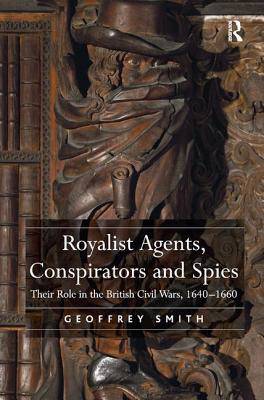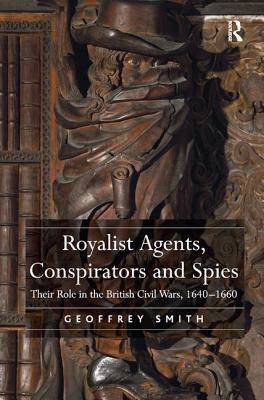
- Retrait gratuit dans votre magasin Club
- 7.000.000 titres dans notre catalogue
- Payer en toute sécurité
- Toujours un magasin près de chez vous
- Retrait gratuit dans votre magasin Club
- 7.000.0000 titres dans notre catalogue
- Payer en toute sécurité
- Toujours un magasin près de chez vous
Royalist Agents, Conspirators and Spies
Their Role in the British Civil Wars, 1640�1660
Geoffrey Smith
Livre relié | Anglais
305,45 €
+ 610 points
Description
Between 1640 and 1660 the British Isles witnessed a power struggle between king and parliament of a scale and intensity never witnessed, either before or since. Although often characterised as a straight fight between royalists and parliamentarians, recent scholarship has highlighted the complex and fluid nature of the conflict, showing how it was waged on a variety of fronts, military, political, cultural and religious, at local, national and international levels. In a melting pot of competing loyalties, shifting allegiances and varying military fortunes, it is hardly surprising that agents, conspirators and spies came to play key roles in shaping events and determining policies. In this groundbreaking study, the role of a fluctuating collection of loyal, resourceful and courageous royalist agents is uncovered and examined. By shifting the focus of attention from royal ministers, councillors, generals and senior courtiers to the agents, who operated several rungs lower down in the hierarchy of the king's supporters, a unique picture of the royalist cause is presented. The book depicts a world of feuds, jealousies and rivalries that divided and disorganised the leadership of the king's party, creating fluid and unpredictable conditions in which loyalties were frequently to individuals or factions rather than to any theoretical principle of allegiance to the crown. Lacking the firm directing hand of a Walsingham or Thurloe, the agents looked to patrons for protection, employment and advancement. Grounded on a wealth of primary source material, this book cuts through a fog of deceit and secrecy to expose the murky world of seventeenth-century espionage. Written in a lively yet scholarly style, it reveals much about the nature of the dynamics of the royalist cause, about the role of the activists, and why, despite a long series of political and military defeats, royalism survived. Simultaneously, the book offers fascinating accounts of the remarkable activities of a number of very colourful individuals.
Spécifications
Parties prenantes
- Auteur(s) :
- Editeur:
Contenu
- Nombre de pages :
- 296
- Langue:
- Anglais
Caractéristiques
- EAN:
- 9780754666936
- Date de parution :
- 28-12-10
- Format:
- Livre relié
- Format numérique:
- Genaaid
- Dimensions :
- 156 mm x 234 mm
- Poids :
- 594 g

Les avis
Nous publions uniquement les avis qui respectent les conditions requises. Consultez nos conditions pour les avis.






